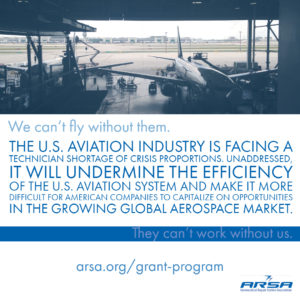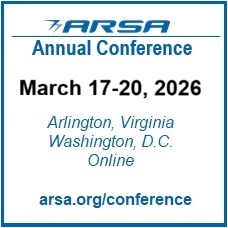Technician Shortage a “Gathering Storm” … with Solutions on Horizon
A shortage of maintenance technicians is hurting small aviation companies, the aerospace sector and the entire U.S. economy, Aeronautical Repair Station Association (ARSA) Vice President of Communications Brett Levanto told Congress.
Levanto’s comments came during a Sept. 26 House Small Business Subcommittee on Contracting and Workforce hearing entitled, “Troubled Skies: The Aviation Workforce Shortage’s Impact on Small Businesses.” ARSA is the international trade association for repair stations, maintenance facilities certificated by the Federal Aviation Administration (FAA) and other civil aviation authorities. Its membership also includes manufacturers, parts producers, operators and other aviation stakeholders around the world.
“Recruiting and retaining the next generation of aviation professionals is the most pressing strategic challenge facing the aviation maintenance community,” Levanto said. “For aviation businesses – large and small – the development, production, operation and maintenance of the world’s safest transportation system depends on a skilled, dedicated and knowledgeable workforce that is personally invested for the long term.”
Levanto emphasized that while the popular perception is that the aviation industry is dominated by big companies, “small businesses are the rule, rather than the exception” and of the 4,900 aviation maintenance firms worldwide, 81 percent are small and medium sized companies.
The workforce data Levanto presented during his testimony paint a picture of a gathering storm: Eighty-two percent of respondents to a recent ARSA survey have had difficulty finding technicians and ARSA projects its members have as many as 2,500 unfilled technical positions. The association projected in 2017 that unfilled positions cost U.S. maintenance companies $1.95 billion in lost opportunity and foregone revenue each year.
Levanto said that because of the technician shortage ARSA members are taking longer to complete work for customers, declining to add new capabilities, turning down work and electing against facility expansion. Those impacts, in turn, make the nation’s aviation system less efficient and slow economic growth, both nationally and in communities across the country where repair stations are located.
And the technician shortage could get much worse. Boeing projects the need for 189,000 new technicians in North America over the next two decades and a mass of retirements (27 percent of FAA certificated mechanics are older than 63) will leave a daunting bigger hole to fill.
But the news isn’t all bad. Levanto told the subcommittee that Congress has woken up to problem and the FAA reauthorization bill expected to be approved shortly by the House and Senate contains an entire aviation workforce development title, including a new grant program to help attract and retain the aerospace technicians. Highlighting the “shared responsibility to grow the next generation of aviation professionals,” Levanto encouraged the subcommittee’s members: “By voting for the FAA bill, you will be doing just that.”
He also suggested that Congress could mobilize the Small Business Administration (SBA) in the effort.
“Small aviation businesses have limited size and reach, tight margins and heavy regulatory burdens; they need assistance developing relationships and resources in order to obtain and maintain a technical workforce capable of harnessing sustained economic growth,” Levanto said.
By providing points of connection through the SBA between technical education institutions, supportive industry groups and other stakeholders, Congress can provide venues for growth, lessons learned and career development between and among repair stations and other aviation businesses.”
To read Levanto’s complete written testimony, click here.
For more information on the hearing, click here or watch the video below:
Previous Small Business Committee Testimony...
4/8/11 - ARSA Recommends Reg Flex Improvements at House Small Business Hearing
April 8, 2011
ALEXANDRIA, VIRGINIA, March 30, 2011 – At a March 30 congressional hearing, Craig Fabian, the Aeronautical Repair Station Association’s (ARSA) vice president of regulatory affairs and assistant general counsel, recommended actions Congress could take to improve the Regulatory Flexibility Act (Reg Flex or RFA).
The House Small Business Committee hearing, “Reducing Federal Agency Overreach: Modernizing the Regulatory Flexibility Act,” lays the foundation for future consideration of RFA reform and agency compliance with the Act.
Fabian described difficulties ARSA has faced challenging a Federal Aviation Administration (FAA) drug and alcohol testing rule on RFA grounds.
“ARSA’s experience in dealing with federal agencies reveals that the RFA is treated as an annoying burden to the rulemaking process,” Fabian stated. “The agency’s objective seems to be finding a way to avoid engaging in the daunting task of compiling the economic data and considering alternatives to a proposed rule.”
In a 2007 legal challenge, a court sided with ARSA and commanded the FAA to perform an RFA analysis. However, nearly four years later, the agency has still not complied with the court’s mandate. “Indeed, even when specifically commanded by a court of law to carry out an analysis, federal agencies are prone to engage in foot dragging in the apparent hope that the requirement will just go away,” Fabian said.
Fabian suggested several ways Congress could strengthen the RFA, including:
• Creating consequences for failure to comply with Reg Flex requirements;
• Ensuring agencies account for indirect impacts;
• Preventing agency backpedaling on small business impact statements;
• Strengthening statements of congressional intent;
• Enhancing the power of the Small Business Administration’s Office of Advocacy; and,
• Ending congressionally-mandated timelines that rush the rulemaking process.
These improvements would ensure that the RFA analyses are done “right rather than fast” and that existing small business protections have their intended effect.
For more information about the hearing, please visit the House Small Business Committee’s website.
To view Fabian’s testimony, click here. For more information on ARSA’s RFA drug and alcohol testing rule challenge visit here.









